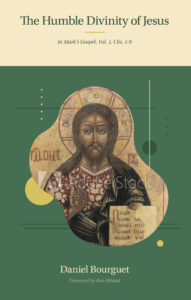Bob Ekblad's Blog, page 3
July 16, 2024
Preparing the way for Jesus— and not for a false Christ, or the next US (or any) President
 “Prepare the way of the Lord!” writes Isaiah the prophet– and John the Baptist does this, announcing Jesus. He identifies Jesus as Israel’s Messiah, God’s own Son, the lamb of God, Savior of the world, coming King. He baptizes Jesus, points his own disciples to him and defers to him: “He must increase, but I must decrease” (Jn 3:30).
“Prepare the way of the Lord!” writes Isaiah the prophet– and John the Baptist does this, announcing Jesus. He identifies Jesus as Israel’s Messiah, God’s own Son, the lamb of God, Savior of the world, coming King. He baptizes Jesus, points his own disciples to him and defers to him: “He must increase, but I must decrease” (Jn 3:30).
Today far too many Christians are actively preparing the way for their presidential candidate, or political party of choice (and even worshipping them). There is lots of anxiety about what’s going on in our country, and in the larger world—and there are good reasons for deep concern! Clear discernment is needed, and faith and courage.
How can we as disciples of Jesus avoid getting distracted from our highest calling and purpose in life? John the Baptist models prophetic witness that clears the way so we can see and welcome Jesus’ humble Kingdom in our midst—refusing all seductive, deceiving pretenders.
John the Baptist did not prepare the way for religious movements like the Pharisees, Sadducees or zealots, nor did he endorse political figures like Herod, Pilate, or Caesar. Rather, he exposed their abuses, resulting in his incarceration and execution by Herod, who later colluded in Jesus’ crucifixion.
John accomplishes Isaiah 40:3 by recruiting people into a movement of repentance. The Gospels present John as “the voice of one crying in the wilderness” (Lk 3:4). What John the Baptist cries out is an order that directly engages all of us: “prepare ye the way of the Lord, make straight the paths of our God.”
John uses plural imperatives “prepare!” and “make straight!” recruiting each of us to get ready, and ready others, for a particular liberator, Jesus, the Savior of the world. This implies not preparing the way for anyone else, and actively discerning and refusing false saviors!
According to John the Baptist, preparing for Jesus involves rebirth into a new identity and way of thinking, which requires regular confession of sin and active receiving of forgiveness.
“Preaching a baptism of repentance for the forgiveness of sins” is mentioned often in Luke and Acts (Lk 3:3; Acts 13:24; 19:4), and is emphasized in Jesus’ final instructions in Luke 24:47 “that repentance for forgiveness of sins would be proclaimed in his name to all the nations, beginning from Jerusalem.” John’s prophetic role to call people to prepare the way for Jesus continues to be ours too. So we have much learn from him.
John the Baptist modeled prophetic discernment regarding Jesus, by asking Jesus directly to clarify his identity. From his prison cell, John apparently wondered whether Jesus was for sure the awaited Messiah whom he had endorsed. After all, Jesus wasn’t protecting his freedom of religion, or freeing him from persecution and prison. Nor was Jesus freeing Israel from oppression under Herod, Pilate, Caesar and the Roman Army.
While in prison for exposing Herod’s injustices, John sent two of his disciples to ask Jesus directly: “Are you the Expected One, or do we look for someone else” (Luke 7:20)?
“At that very time he cured many of diseases and afflictions and evil spirits; and he gave sight to many blind” (Lk 7:21). He alerts the men to signs associated with the God’s anointed Messiah:
“Go and report to John what you have seen and heard: the blind receive sight, the lame walk, the lepers are cleansed, and the deaf hear, the dead are raised up, the poor have the gospel preached to them. Blessed is he who does not take offense at me” (Lk 7:22-23).
Do you see any of these signs accompanying politicians hailed as God’s candidates today?
Jesus goes on to further clarify extreme humility as a core quality associated with his presence and coming Kingdom.
After John’s two disciples left, Jesus spoke to the crowd about John the Baptist:
“What did you go out into the wilderness to see? A reed shaken by the wind? “But what did you go out to see? A man dressed in soft clothing? Those who are splendidly clothed and live in luxury are found in royal palaces! But what did you go out to see? A prophet? Yes, I say to you, and one who is more than a prophet” (Lk 7:24-26).
In this endorsement of John, Jesus differentiates John from the power and pomp of his era, and certainly from today’s billionaire politicians and their endorsers. But Jesus’ next remarks take us to a whole new level of “not-of-this-world” humility.
“I say to you, among those born of women there is no one greater than John; yet he who is least in the kingdom of God is greater than he.”
Here Jesus declares that John is greater than himself, since he too was born of a woman, as Paul himself specifies in Galatians 4:4:
“But when the fullness of the time came, God sent forth His Son, born of a woman, born under the Law…”
Philemon of Gaza, a sixth-century monk, makes the startling observation about Jesus in his commentary on Luke (forthcoming).
“Here he is telling us that John the Baptist is greater than he is. This humble Jesus bows before the one who prepared his way in the desert and in our hearts. What humility! O my soul, Jesus bows even deeper; he who bowed before the hand of the one who baptized him, now also bows before the least of his brothers in the Kingdom of God. Behold, the least in the Kingdom is greater than John the Baptist and greater than Jesus. No one could be more humble than him [Jesus].”
Reading Philemon of Gaza’s reflections here have shocked and inspired me, inviting me to contemplate a level of humility I hadn’t dared to consider. Might this very humility of Jesus be the most essential sign identifying him as the Expected One?
The humble divinity revealed in Jesus evangelizes us, training us to welcome the true Presence and Kingdom of God. Becoming disciples of Jesus and preparing the way for him, requires that we refuse and disassociate ourselves from the false, pretender liberators and their endorsers (and even worshippers), who cry out through the media and in myriad ways today. Philemon of Gaza continues his reflection by drawing in Paul’s reflection on Jesus’ humble divinity.
“As the holy apostle Paul tells us, a humble person is one who considers others greater than themselves (Phil 2:3). Jesus truly made himself the most humble, and so God also sovereignly exalted him and gave him the name that is above every name, so that at the name of Jesus every knee should bow in heaven and on earth and under the earth, and every tongue confess that Jesus Christ is Lord, to the glory of God the Father (Phil 2:9). O my soul, it is he who speaks to us here, and we hear his gratitude expressed to all who bow the knee before him.”
May we re-orient ourselves afresh to our vocation to prepare the way for Jesus. May we become students of his radical humility through study of the Gospels, regular confession, repentance and actively receiving and offering forgiveness. May we proclaim and live out a liberating alternative to the many false ways and imposters that abound today, fixing our gaze on Jesus, the author and perfecter of our faith (Hebrews 12:2).
Check out my recent podcast “Get ready for God’s Endgame Jesus’ Way: A response to Lance Wallnau and the Courage Tour.”
Philemon of Gaza Meditates Mark’s Gospel, is now available as an Audiobook here, as is Daniel Bourguet’s The Humble Divinity of Jesus in Mark’s Gospel, Volume 1 and Volume 2 paperback, e-book and Audiobook versions.
Check out my podcast “Disciple: Word, Spirit, Justice, Witness” on Spotify or Apple.
May 31, 2024
Discovering Jesus’ Humble Divinity
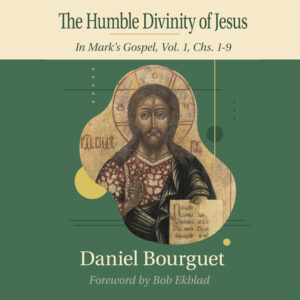 In these times when much damage is done in the name of Jesus, I have been rediscovering Jesus’ humble divinity in the Gospels. I long to see others discover Jesus’ Divine-human identity afresh– a revelation that I believe will compel many to become his disciples.
In these times when much damage is done in the name of Jesus, I have been rediscovering Jesus’ humble divinity in the Gospels. I long to see others discover Jesus’ Divine-human identity afresh– a revelation that I believe will compel many to become his disciples.
Daniel Bourguet’s excellent books The Humble Divinity of Jesus in Mark’s Gospel, Volume 1-2 have been particularly enlightening. I have just been especially blessed reading these books aloud as audiobooks for Audible, to add to The People’s Seminary Press’ paperback and e-book version (links below). Check out this beatiful treatment of Jesus’ words to the paralytic in Mark 2:11.
“I say to you
“When Jesus said to the paralytic: “Rise, take up your bed and go to your home” (2:11), he introduced what he was saying with the words, “I say to you.” We will pause over this expression.
“I say to you”: it is astonishing to see here that Jesus doesn’t invoke anyone’s name to tell the paralytic to stand up. Peter would later say to a sick man, “In the name of Jesus Christ of Nazareth, rise up and walk” (Acts 3:6); he would likewise say that the forgiveness of sins should be received “in the name of Jesus” (Acts 10:43). Paul would do the same as Peter and so say to an evil spirit, “In the name of Jesus Christ, come out of this woman” (Acts 16:18).
The difference between Peter and Paul on one hand and Jesus on the other is huge. Peter and Paul relied on the authority of another, Jesus, to bring about a miracle or to announce the forgiveness of sins. In contrast, Jesus relied on no one to forgive or to perform a miracle, having the authority himself. He is “the Son of Man who has authority to forgive sins,” just as he had authority to call upon the paralytic to stand up. He has the authority as the Son who has received the authority of his Father at the heart of the Trinity.
In Mark’s gospel, Jesus never either performs a miracle or speaks “in the name of God” as did the prophets. Jesus is more than a prophet. His “I say to you” spoken to the paralytic has the authority and power of a divine word. The power of the Word of God means that what it announces is accomplished, as at creation: “God said ‘Light be,’ and the light was” (Gen 1:3). That is what is happening here: Jesus says to the paralytic, “Stand up,” and he stands. The prophet Isaiah reports a word of God that makes this very clear:
“As the rain and the snow come down from heaven and do not return without having watered the earth and caused the plants to grow, or without providing seed to the sower, so is my word that goes out of my mouth: it shall not return to me without effect, without having executed my will and accomplished my plans” (Is 55:10–11).
“I say to you” has the power of a divine word since the Jesus who spoke it is not a prophet who transmits and speaks in the name of God, but is God speaking on his own divine authority.
“I say to you”: this is great discretion on Mark’s part. He reports these few words without any commentary, it is enough to reveal Jesus as God.
In the gospels of Matthew and Luke, we find the same as here in Mark, that Jesus does nothing in the name of God or in the name of his Father. Everything he does is on his own authority, his divine authority. It would seem to be not quite the same in John, but only in appearance; it is more nuanced but the result is the same.
In John’s gospel, then, Jesus says this: “I do the works in the name of my Father” (10:25), which seems to put him on the same level as the prophets. But we should not be mistaken; his speaking in this way is a matter of humility, to honor his Father, because elsewhere he speaks quite differently, in fact that the Father acts in the name of the Son: “The Father will send the Holy Spirit in my name” (14:26).
This last verse is surprising: we see God the Father, who does nothing in anyone else’s name, acting in the name of Jesus, his only Son. How wonderful this is: the Father is so humble that he acts in the name of the Son, just as the Son in his humility acts in the name of the Father. Neither of them is a prophet to the other; each is as humble as the other; each defers humbly to the authority of the other.
Here in Mark’s gospel, Christ’s humility is manifest differently, not in his leaning on the authority of his Father but in effacing himself behind the figure of the Son of Man who has received authority from his Father:
“That you may know that the Son of Man has authority to forgive sins, I say to you, Stand up, take up your bed and go to your home.” p.23-25.
The Humble Divinity of Jesus in Mark’s Gospel, Volume 1, Audiobook.
The Humble Divinity of Jesus in Mark’s Gospel, Volume 1 (Chapters 1-9), paperback and e-book versions.
April 8, 2024
Join us for “Word on the Street: Transformational Bible Study, Social Justice and Peacemaking”
Join us for twelve online Zoom sessions that equip participants to better interpret local and global realities in the light of a careful and contemplative reading of Scripture.
This training corresponds to Module 3 of The People’s Seminary’s Certificate in Transformational Ministry at the Margins– which we are opening up to the larger community. We have just completed this module in Zambia and S. Africa, and feel an urgency to offer it more broadly now.
In this course we seek to equip Jesus-followers to live out and share a liberating and empowering gospel in this increasingly polarized world– with a focus on poor, marginalized, and under-reached communities.
This training includes practical steps in how to more carefully and prayerfully read and study the Bible, interpreting difficult, “toxic” texts in the light of the cross (on the Road to Emmaus), and learning to better interpret current political and social realities in the light of God’s revelation in Scripture.
While this notice may be last minute for many of you (since the training starts April 9, all the sessions are recorded, and you are welcome to join in when you’re available.
12 Sessions:
April 9 Informed from above: Contemplative reading of Scripture
April 16 Prophetic ministry according to John the Baptist
April 23 Steps in interpreting a Biblical text—example “Genesis 16- the call of Hagar”
April 30 Biblical hospitality to strangers according to Genesis 18-19
May 7 Resisting Racism
May 14 Understanding the death of the firstborn in Exodus 12
May 21 Challenging the myth of redemptive violence
May 28 Confronting male passivity in the rape of Tamar
June 4 Exposing the spiral of violence—Judges 19
June 11 Praying the imprecatory Psalms and spiritual warfare
June 18 The end of history- reading the times in the light of apocalyptic Scriptures
June 25 Resistance as strangers and aliens
When? Begins April 9, 2024. Continues on Tuesdays, 10:30am-12:00pm (PST)
Entry Fee:
$250 USD* -LIVE TEACHING WEBINAR ($50.00 of which funds trainings in Africa and the Global South). Partial and full scholarships are available at sign-up.
Sign up here.
April 2, 2024
The People’s Seminary Moving Forward
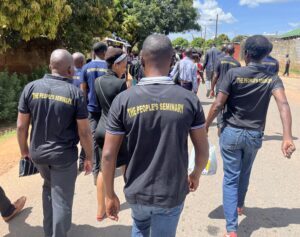 When Gracie and I lived in rural Honduras in the 1980s we were deeply impacted by the education gap between ourselves and the people there. We had recently graduated from university at age 24 and 22. In those days it was rare to find any Honduran who had gone past third grade. A huge percentage of rural Hondurans were illiterate.
When Gracie and I lived in rural Honduras in the 1980s we were deeply impacted by the education gap between ourselves and the people there. We had recently graduated from university at age 24 and 22. In those days it was rare to find any Honduran who had gone past third grade. A huge percentage of rural Hondurans were illiterate.
We learned to teach sustainable farming and preventative health in ways that were hands-on, simple but not simplistic. When we began offering Bible studies we quickly discovered that reading shorter portions of Scripture, identifying local equivalents to biblical locations, characters, and Jesus’ liberating message, required deliberation and creativity. We saw that acting-out Biblical stories made them much more understandable, relevant and fun. This has marked our ministry up to the present.
We were and continue to be inspired by Jesus, who seems to have mostly taught outdoors (as we did in Honduras)– on mountainsides, along the seashore, roadsides, and also in places of worship (synagogues and the temple).
Paulo Freire’s writings on educating for critical awareness, the contextual Bible study innovators like Carlos Mesters and Gerald West inspired us. The People’s Seminary was born under the shade of mango trees, on the slopes of corn fields and in humble homes.
We pursued graduate studies with the objective of making quality education accessible to the poor and excluded. Now, The People’s Seminary is the training arm of Tierra Nueva. Locally we equip people to read the Bible for personal and social transformation, with a focus on the incarcerated, addicted, unhoused and recovering addicts.
We’ve developed our Certificate in Transformational Ministry at the Margins (CTMM), consisting of three modules (42 sessions) which can be delivered in four days per module. We have now completed 32 full CTMMs to around 2,000 people in 19 countries.
Last week we returned from Zambia and South Africa, where we offered the third of three modules, “The Word on the Street: Transformational Bible Study, Justice and Peacemaking.” This module focussed on helping people read the Bible closely and in direct rapport with their lives.
Much of this last module involved breaking up the larger group of 250 participants (in Zambia), and 30 plus in Cape Town, into smaller groups to discuss stories from the Bible that addressed social issues like racism (Acts 10), sexual violence (the rape of Tamar), retributive violence (Luke 6), hospitality to strangers (Genesis 18-19) and liberating messages from the Gospels. Whenever possible we acted out Biblical texts– which was a lot of fun and made the Scriptures come alive.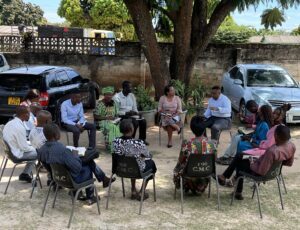 In Zambia we came with a team of nine trainers, each of whom had already graduated from CTMMs in their countries, including three from Zimbabwe, three from Mauritius, one from Winnipeg, and Gracie and I (photo below). Our objective is to develop more and more teams to offer new CTMMs (without us) in other countries where we are invited.
In Zambia we came with a team of nine trainers, each of whom had already graduated from CTMMs in their countries, including three from Zimbabwe, three from Mauritius, one from Winnipeg, and Gracie and I (photo below). Our objective is to develop more and more teams to offer new CTMMs (without us) in other countries where we are invited.
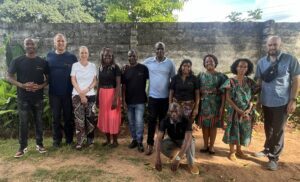 Already, my brother Andy has offered numerous CTMMs in Kenya and Uganda together with a team of African trainers through his Beautiful Gate Ministries.
Already, my brother Andy has offered numerous CTMMs in Kenya and Uganda together with a team of African trainers through his Beautiful Gate Ministries.
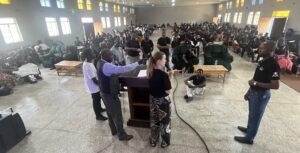
National host communities provide the venue, do all the on-the-ground organizing, including meal preparation, worship and local transportation.

 Our main objective is to offer training to people who normally would have little to no access due to lack of qualifications, finances or remote locations. For theological education and ministry training to be accessible, we most go to where the people are– whether that be a prison cell, an African village or an impoverished slum.
Our main objective is to offer training to people who normally would have little to no access due to lack of qualifications, finances or remote locations. For theological education and ministry training to be accessible, we most go to where the people are– whether that be a prison cell, an African village or an impoverished slum.
After our trip to Zambia we traveled to Cape Town, where we offered our final module to the Tree of Life community, which works with young women and men coming out of gangs in the township of Manenberg.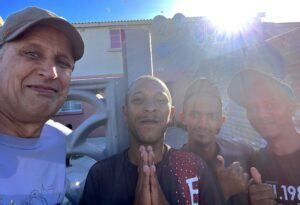
Street ministry with Tree of Life team in Manenberg (above). Graduates from Tree of Life CTMM (below). We were deeply touched by a final graduation ceremony organized by the Zambian Bishop Boyd, who hosted us. Most of the graduates had never received a formal certificate for any kind of training. Many had not gone beyond sixth grade.
We were deeply touched by a final graduation ceremony organized by the Zambian Bishop Boyd, who hosted us. Most of the graduates had never received a formal certificate for any kind of training. Many had not gone beyond sixth grade.
This ceremony was complete with marching band (see video below), and caps and gowns for the nine of us trainers. Somehow our host had come up with their own resources to have tee shirts printed for every participant. We learned that the band members played in exchange for a simple lunch!
Currently we are preparing new CTMMs in Burundi (beginning late August), Lesotho and Malawi (September). We are also offering Zoom trainings for Christians in the underground church in Iran. Our vision includes:
Expanding our Certificate in Reading the Bible for Liberation to more inmates in the Washington State prison system and beyond, using my Guerrilla Gospel and Guerrilla Bible Studies series.Offering more Zoom and online training to people in restricted countries.Expanding CTMMs in Francophone Africa.Starting new CTMMs to train ministry workers serving excluded populations in the West.Continue publishing books, manuals and other training resources through The People’s Seminary Press.Check out our online courses, including the CTMM, here.
Sign up for CTMM Module 3, “Word on the street: transformational Bible study, social justice & peacemaking,” beginning April 9 here.
Please consider helping us fund these trainings, which involve covering travel expenses for trainers, manuals and one meal per day for course participants. You can contribute online here, or by sending a donation earmarked The People’s Seminary to PO Box 410, Burlington, WA 98233.
March 30, 2024
Do We Desire A Better Country?
Abraham’s departure from his homeland in response to the Word of God is presented as the quintessential action of Biblical faith. As people of faith today, we are still called to a kind of landless, stateless status. There we join with refugees, persecuted believers in restricted countries, undocumented immigrants, the unhoused and every kind of exile, orienting ourselves towards a Kingdom not of this world.
“By faith Abraham, when he was called, obeyed by going out to a place which he was to receive for an inheritance; and he went out, not knowing where he was going. By faith he lived as an alien in the land of promise, as in a foreign land dwelling in tents with Isaac and Jacob, fellow heirs of the same promise; for he was looking for the city which has foundations, whose architect and builder is God” Hebrews 11:8-10).
Gracie and I have regular contact with people of faith who have little to no possibility of security in this world. We’re deeply inspired by sub-Sahara African house-church leaders in Morocco, who themselves have fled war zones in their home countries, choose to pastor migrants on their way to Europe. We accompany undocumented immigrants in the fields of Skagit County, USA, who have no hope of being granted legal status here, and no viable future in Mexico. They desire a better country that I’m finding myself increasingly desiring too.
On the day of his arrest Jesus clearly stated:
“My kingdom is not of this world. If my kingdom were of this world, then my servants would be fighting so that I would not be handed over to the Jews; but as it is, my kingdom is not of this realm.”
Would that all of us who call ourselves Christians today fully embrace this Jesus as Savior, Messiah/Christ.
To do this though we must accept an insecure status in this world, stepping away from attachments and security mindsets of the “haves,” and into the insecurity of the “have nots.”
“All these died in faith, without receiving the promises, but having seen them and having welcomed them from a distance, and having confessed that they were strangers and exiles on the earth. For those who say such things make it clear that they are seeking a country of their own” (Heb 11:13-14).
Yesterday, Good Friday, I had the privilege of leading a two-hour Zoom teaching session with Iranian believers inside of Iran. Jesus-followers in restricted countries have no expectation that they’ll have state-sanctioned religious freedom or come to have power in any way. Yet they choose to risk imprisonment and even death, meeting secretly to worship, study the Bible and pray.
I was deeply humbled when they asked me to lead them in Communion at the end of our study, where we joined together in the Sacrament as the Body of Christ.
We in the West, like our sisters and brothers in restricted countries, are called to embrace a “stranger and alien” status. This status must be continuously chosen as we resist the temptation to return to earthly securities.
“And indeed if they had been thinking of that country from which they went out, they would have had opportunity to return. But as it is, they desire a better country, that is, a heavenly one. Therefore God is not ashamed to be called their God; for he has prepared a city for them” (Heb 11:15-16).
Do we desire a “better country?”
If yes, then this may well mean engaging in deliberate renunciations of our securities and entitlements, which is especially difficult if we have grown up privileged.
We are not called to fight for our rights, our “freedoms,” our party or nation here on this earth, though Jesus certainly showed us he loved the world and cared for people body, soul and spirit. Jesus healed the sick, cast out demons, fed the hungry crowds—teaching and preaching the Gospel to them, calling to do likewise.
I myself find Hebrews 11:24-26 highly relevant, yet also highly challenging.
“By faith Moses, when he had grown up, refused to be called the son of Pharaoh’s daughter, choosing rather to endure ill-treatment with the people of God than to enjoy the passing pleasures of sin, considering the reproach of Christ greater riches than the treasures of Egypt; for he was looking to the reward.”
May we arise to join Jesus in his Kingdom now, fully in this world, but deliberately not of it. May we learn to look “to the reward,” to the City prepared for us by God.
May we remember that this will not happen automatically as we attend churches, listen to podcasts or even engage in spiritual and social practices. We are called to reorient our lives towards Jesus, stepping into a new lifestyle that follows.
“Therefore, since we have so great a cloud of witnesses surrounding us, let us also lay aside every encumbrance and the sin which so easily entangles us, and let us run with endurance the race that is set before us, fixing our eyes on Jesus, the author and perfecter of faith, who for the joy set before him endured the cross, despising the shame, and has sat down at the right hand of the throne of God.”
The book of Hebrews teaches us that following Jesus involves dislocation, departure to a place “outside” whatever “insider” camp within which we find ourselves.
This frees us to join alongside others living in precarious circumstances as fellow travelers, bearing witness to a more certain hope, that we step into by faith.
“So, let us go out to him outside the camp, bearing his reproach. For here we do not have a lasting city, but we are seeking the city which is to come” (Heb 13:13-14).
March 10, 2024
Exalting Jesus in Zambia and Beyond
 I’ve been perplexed for years by calls in the Psalms to exalt or extol the Lord, to lift up the name of Jesus, to declare him worthy of praise and such. If God is already the Creator of the universe, in the highest heaven, and Jesus is at his right hand, how can we exalt him higher than he already is?
I’ve been perplexed for years by calls in the Psalms to exalt or extol the Lord, to lift up the name of Jesus, to declare him worthy of praise and such. If God is already the Creator of the universe, in the highest heaven, and Jesus is at his right hand, how can we exalt him higher than he already is?
For us to declare Jesus as worthy of praise has always seemed presumptuous to me– as if we, sinful humans are in the place of judging Jesus’ worthiness! So why are we called to exalt our God: Father, Son and Holy Spirit? Scripture invites this action everywhere!
“O magnify the Lord with me, and let us exalt his name together” (Ps 34:3).
“Be exalted above the heavens, O God; Let your glory be above all the earth” (Ps 57:5).
“Exalt the Lord our God and worship at his holy hill, for holy is the Lord our God” (Ps 98:9).
Slowly over the past two weeks I’ve been getting glimpses of something beautiful that I will now try to share.
In order to exalt someone, to extol them, to lift them up, or declare their worthiness they must be perceived to be at a low place– down and lower, and not up or higher. Declaring them worthy is necessary only if they would normally appear unworthy.
God is described throughout Scripture as down with the poor and lowly. The Lord comes down among the Israelite slaves in Egypt, seeing their affliction, hearing their cry because of their taskmasters and knowing firsthand their suffering” (Ex 3:7). The Psalmist writes:
“The Lord is near to the brokenhearted and saves those who are crushed in spirit” (Ps 34:18).
“Where can I go from Your Spirit? Or where can I flee from Your presence?” writes the Psalmist in Psalm 139:9, and then answers
“If I ascend to heaven, you are there; if I make my bed in Sheol, behold, you are there. If I take the wings of the dawn, if I dwell in the remotest part of the sea, even there your hand will lead me, and your right hand will lay hold of me” (Ps 139:8-10).
God is the Creator of the universe, and is victor over death. God’s location as transcendent and down low is clearly stated in Isaiah 57:15.
“I dwell on a high and holy place, and also with the contrite and lowly of spirit. In order to revive the spirit of the lowly and to revive the heart of the contrite.”
Jesus is described by Paul in Philippians 2:5-8 as choosing to go down to the lowest place.
“Although he existed in the form of God, did not regard equality with God a thing to be grasped, but emptied himself, taking the form of a bond-servant, and being made in the likeness of men. Being found in appearance as a man, He humbled himself by becoming obedient to the point of death, even death on a cross.”
Two nights ago in a humble church on the outskirts of Ndola, Zambia I shared these reflections. A perfect story illustrating Jesus’ lowly, downward presence suddenly comes to mind.
I invite people to read the story of Jesus’ healing of the man who had been ill for 38 years. I invited my colleague from Zimbabwe, pastor Richard, to play Jesus, and ask someone to read John 5:1-2
“After these things there was a feast of the Jews, and Jesus went up to Jerusalem. Now there is in Jerusalem by the sheep gate a pool, which is called in Hebrew Bethesda, having five porticoes.”
I ask people where Jesus was going, and we notice he was heading up to Jerusalem to the feast. I point to where the drum set and keyboard were up at the front left, and to the lectern up on the stage- all under bright lights (see photo above).
“Let’s say this is Jerusalem, the place of the feast,” I say. “But did Jesus finally go there? What other place is mentioned?” I ask.
I talk about the sheep gate where there were five porticos, where Jesus goes instead of to the feast. I search the room for an equivalent, and notice the cement steps in the far back corner that led outside to the street. That corner was in the dark, and had some mops and buckets. We read the next verse and I suggest we follow Jesus there.
“In these lay a multitude of those who were sick, blind, lame, and withered, waiting for the moving of the waters; for an angel of the Lord went down at certain seasons into the pool and stirred up the water; whoever then first, after the stirring up of the water, stepped in was made well from whatever disease with which he was afflicted. A man was there who had been ill for thirty-eight years” (Jn 5:3-5).
I ask if someone would like to be the man ill for 38 years, and the leader hosting the meeting volunteers. I learn later that he is a Major in the Zambian military. He goes and sits in the back corner on the floor.
I ask people what image of God people at the pool would have based on the angel only healing the first person who gets into the pool when the water is stirred.
“God helps the first, the fastest, the strongest, the ones who follow the exact rules,” someone said, and most assume God’s like that.
“Let’s see what kind of God Jesus reveals,” I say.
I then follow Richard (playing Jesus) from the front to the dark back of the room where our “pool of Bethesda,” is located (photo below).
 Functioning as narrative, I read the next verse, John 5:6, “When Jesus saw him lying there, and knew that he had already been a long time in that condition, he said to him,” and Richard takes the mic and asks the man:
Functioning as narrative, I read the next verse, John 5:6, “When Jesus saw him lying there, and knew that he had already been a long time in that condition, he said to him,” and Richard takes the mic and asks the man:
“Do you wish to get well?”
I note that Jesus didn’t introduce himself, so the man wouldn’t have known who he was. Jesus reveals a God who comes down into our place of suffering, sees us and respectfully asks us if we want to be well.
I give the mic to the man playing the sick man who responds:
“Sir, I have no man to put me into the pool when the water is stirred up, but while I am coming, another steps down before me.”
Richard then says to him: “Get up, pick up your pallet and walk.”
When we read how “immediately the man became well, and picked up his pallet and began to walk,” the man gets up and we walk together back up to the front of the church.
It was deeply moving to see this story acted out. Suddenly it was obvious that Jesus reveals a God who deliberately comes down into the places of suffering, pain and exclusion to exalt the humble. Jesus shows what God is always about– presence to respect, save, heal, call.
Jesus makes no requirements of the man– that he believe in him as God’s Son, the Christ, the Savior. Jesus doesn’t exalt himself in any way. Rather he respects the man, asking him what he wants. He shows his belief in him, speaking a word that empowers him to get up, take up his mat and walk. It’s for us to take note of Jesus and his action– to point them out, to exalt the one who otherwise does this so humbly, almost in secret.
I end by inviting people to hear some words from Mary’s son in Luke 1, and then suddenly decide to ask if there’s a young woman age 13, the likely age of Mary in the room.
A young woman stands and comes to the front. I read how the angel Gabriel visits her, telling her “the Lord is with you.” The angel’s presence and words confirm once again God’s location down-below, with the humble. When young Mary asks how could this happen since she’s a virgin, the angel replies:
“The Holy Spirit will come upon you, and the power of the Most High will overshadow you; and for that reason the holy Child shall be called the Son of God” (Lk 1:35).
I invite the young Zambian Mary to read Mary’s own words in Luke 1:51-53. As she reads haltingly into the microphone I suddenly see Jesus, and want to draw attention to him beautiful work– to exalt him.
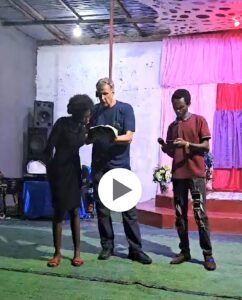 “He has scattered those who were proud in the thoughts of their heart. He has brought down rulers from their thrones, and has exalted those who were humble. He has filled the hungry with good things; and sent away the rich empty-handed.”
“He has scattered those who were proud in the thoughts of their heart. He has brought down rulers from their thrones, and has exalted those who were humble. He has filled the hungry with good things; and sent away the rich empty-handed.”
There in this humble Zambian faith community it suddenly becomes clear that God comes down from his throne in Jesus and hits bottom to join us.
There, amongst the poor, the unwell, the despairing– in the heart of human suffering Jesus shows God’s action to lift up, to empower, to exalt the humble. In drawing attention to God’s powerful actions here, most visible him his exalting of own Son Jesus after his death on the cross, I catch another glimpse of what it means to exalt him myself, and want to put the spotlight on him. I want to declare him worthy, the one who looks so unworthy in eyes of the world in his total identification with the despised and rejected.
I suddenly feel compelled to get on my hands and knees and crawl towards he Major in the Zambian military who had played the man Jesus healed, who is seated in the front row. He looks both shocked and deeply touched. I suggest that we need to look low, searching the low places for the one who washes his disciples’ feet. And when we see him we can then point him out, lift him up, extol him as the King of Kings.
I invite people forward who feel a need for God to encounter them in their suffering, to lift them up, to come near to them if they are brokenhearted and save them if they are crushed in spirit. Nearly everyone comes forward and we pray for one another. May God open our eyes so we can see Jesus in the dark corners of our life and world, so we in turn can tell everyone about him.
Check out my weekly podcast “Disciple: Word, Spirit, Justice, Witness” below.
February 17, 2024
Discernment in a time of deception: Learning to identify & receive the true Savior
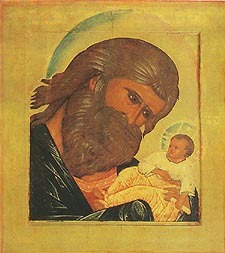 Luke’s Gospel presents a man named Simeon as the first to identify Jesus as the world’s consoling, Savior King. In alignment with the Magi of Matthew’s Gospel, who follow a star to the Bethlehem stable, Simeon identifies Jesus in his child state, speaking prophetic words over him that alert us to how Jesus and his way might be identified and received, or rejected now. In a time of socio-political turmoil and partisan division, let’s see what we can learn from Simeon to help us rightly discern Jesus and his Kingdom now.
Luke’s Gospel presents a man named Simeon as the first to identify Jesus as the world’s consoling, Savior King. In alignment with the Magi of Matthew’s Gospel, who follow a star to the Bethlehem stable, Simeon identifies Jesus in his child state, speaking prophetic words over him that alert us to how Jesus and his way might be identified and received, or rejected now. In a time of socio-political turmoil and partisan division, let’s see what we can learn from Simeon to help us rightly discern Jesus and his Kingdom now.
“And there was a man in Jerusalem whose name was Simeon; and this man was righteous and devout, looking for the consolation of Israel; and the Holy Spirit was upon him” (Lk 2:25).
Luke distinguishes Simeon from other men who lived in Jerusalem by observing that this man was righteous and devout, inviting us to consider what this might mean and where we stand in comparison. All we know about him are his subsequent actions.
Simeon was looking for the consolation (paraklesis) of Israel, which suggests that he hadn’t yet found consolation in the religion and politics of his time. The underlying Greek verb translated “looking for,” prosdechomai, is not the usual verb for literal physical looking with the eyes. Rather its meaning has to do with the action of “looking for, expecting, receiving or giving access to oneself, and embracing.”
In our Tierra Nueva faith community I recently asked the question: “what do we find ourselves going after in attempts to comfort ourselves?”
People mention the expected “drugs, sex, food, money, our image, the Casino, work…,” and we readily confess that our comforts of choice do not fully satisfy. We can identify with Simeon in his wanting and waiting for something more.
Though the Holy Spirit was upon Simeon, and this Spirit is identified by Jesus as the Comforter (parakletos– Jn 14:16,26), Simeon was still expecting something more, or someone in addition to the Spirit. The next verse gives us the key.
“And it had been revealed to him by the Holy Spirit that he would not see death before he had seen the Lord’s Christ” (Lk 2:26).
The Holy Spirit who was upon Simeon, had also personally revealed to him that he would see (horao) the Lord’s Christ, the Messiah, before he saw (horao) death. The Greek verb horao combines physical and spiritual seeing, suggesting a contemplative posture here. It was this revelation that caused Simeon to ready himself prayerfully, waiting and actively anticipating meeting the expected One. This also required that he evaluate and refuse pretender saviors or false Messiahs—a posture that is desperately needed today, as Jesus warned his followers:
“See to it that you are not misled; for many will come in my name, saying, ‘I am He,’ and, ‘The time is near.’ Do not go after them” (Lk 21:8).
Who or what is actively seeking your allegiance, trust or vote? I feel challenged by Simeon and Jesus to fine-tune my spiritual and political discernment.
“So, what more can we learn from Simeon as he moves towards recognizing Jesus as the one and only Savior?” I ask.
“And he came in the Spirit into the temple,” Luke continues (and notice this is now the third time he identifies the Spirit’s presence). In the first instance, the Holy Spirit is “upon” (epi) Simeon (Lk 2:25). In the second instance the Holy Spirit had revealed to Simeon details about the timing of his seeing (Lk 2:26). Now in the third instance Simeon is physically moving (he came) “in (en) the Spirit” into the temple. Simeon models a full-immersion in the Spirit, and this leads to direct action.
Simeon’s movements in the Spirit are chronologically coordinated with the moment Jesus’ parents bring Jesus into the temple in compliance with the Mosaic Law.
“And when the parents brought in the child Jesus, to carry out for him the custom of the Law” (Luke 2:27) timely alignment with Simeon becomes possible, resulting in their physical meeting and the pledging of total allegiance. I think of Hebrews 1:6, which speaks of God.
“And when he [God] again brings the firstborn [Jesus] into the world, he says, “and let all the angels of God worship him.”
Let’s look at which law Jesus’ parents were fulfilling here, to understand what Simeon was tuning into.
In direct association with the Jewish Passover, God required Israelites to “sanctify to me every firstborn… it belongs to me” (Ex 13:2). On the eve of Passover, every Jewish family was to take an unblemished, male lamb, in the place of their firstborn son, slaughtering it, sprinkling the doorpost and lintel of each family’s house with its blood. By doing so, the angel of death would “pass over” the family gathered inside the home when Egypt’s firstborn were struck on the eve of God’s liberation of his people from slavery.
The Law indicated that the firstborn could be redeemed either with a lamb, or if the family were too poor, they could sacrifice turtledoves or pigeons. In the case of Jesus’ parents, Luke 2:22-24 specifies:
“they brought him up to Jerusalem to present him to the Lord (as it is written in the Law of the Lord, “Every firstborn male that opens the womb shall be called holy to the Lord”) and to offer a sacrifice according to what was said in the Law of the Lord, “a pair of turtledoves or two young pigeons.”
Many Jewish parents brought in their firstborn sons into the temple to comply with the Law’s prescriptions regarding the redemption of the firstborn in Exodus. In compliance with the Law, Mary and Joseph’s firstborn and God’s firstborn son needed to be redeemed by sacrifices proscribed by the Law, so Jesus’ earthly ministry as the fully-human Son of God could take place—fulfilled in his death on behalf of all humanity as God’s firstborn Son.
Had Simeon considered Jesus’ parents according to normal class prejudices, he may have disqualified this baby as the Messiah, since his parents redeemed their firstborn son with the humble offering allowable to an impoverished couple.
Luke’s description of “the child Jesus” makes use of the Greek noun paidion, rather than referring to Jesus as their “firstborn son.” This aligns the story directly to the Septuagint version of Isaiah 9:5-6, which Simeon most certainly knew.
“Because a child (paidion) was born for us, a son also given to us, whose sovereignty was upon his shoulder, and he is named Messenger of Great Counsel, for I will bring peace upon the rulers, peace and health to him. His sovereignty is great, and his peace has no boundary upon the throne of David and his kingdom, to make it prosper and to uphold it with righteousness and with judgment from this time onward and forevermore.”
Simeon was most certainly also familiar with Isaiah 53:1-3, where in the Septuagint version the Servant of the Lord is here referred to as paidion.
“Lord, who has believed our report? And to whom has the arm of the Lord been revealed? He grew up before him like a child (paidion), like a root in a thirsty land; he has no form or glory, and we saw him, and he had no form or beauty. But his form was without honor, failing beyond all men, a man being in calamity and knowing how to bear sickness; because his face is turned away, he was dishonored and not esteemed.”
We can assume that Simeon comes into the temple as a true believer in Isaiah’s report, as one trained by his knowledge of Scripture to know what to look for, to whom the Spirit had specifically revealed that he would “not see death until he saw the Lord’s Christ.”
Right when the parents bring in the child, “then he took him into his arms, and blessed God,” writes Luke, reflecting Simeon’s total embrace of God’s firstborn Son, the Suffering Servant.
There’s no mention of turtledoves or pigeons. Simeon here is embracing Jesus as God’s offering of his firstborn– the lamb of God. It’s like Simeon is ahead of John the Baptist, who identified Jesus: “Behold the Lamb of God, who takes away the sin of the world!” (Jn 1:29).
The underlying Greek verb used here, dechomai, has an especially rich meaning, including “to welcome, to receive readily, to accept, to have as a guest.”
While fully embracing the child Jesus, Simeon next says something that is completely shocking, revealing a profound awareness of Jesus’ identity. He blesses God, and then says to the child Jesus there in his arms:
“Now despota,” says Simeon, not using the expected title kurios that usually translates Lord). Despota means “absolute ruler, master,” and can refer to a human master over servants (1 Tm 6:1; Titus 2:9; 1 Pt 2:18), but also God (Acts 4:24) and Jesus (2 Tm 2:21; 2 Pt 2:1; Jude 4; Rev 6:10).
Simeon’s recognition of who Jesus is causes him to humble himself to the extreme before his Master. He tells the child Jesus: “You are releasing your bond-servant [slave] to depart in peace, according to your word” (Lk 2:29)– which the Holy Spirit had revealed. There as Simeon receives the comfort he’s been actively awaiting, he surrenders himself as a humble servant to the Master Comforter, and then gives his carefully-crafted reason.
“For my eyes have seen your salvation, which you have prepared in the presence of all peoples, a light of revelation to the Gentiles, and the glory of your people Israel” (Lk 2:30-32).
According to Simeon, his own seeing of God’s salvation is something possible for everyone. God has prepared it publicly before all peoples, as a revelatory light to the non-Jews, the very glory of God’s people Israel. Yet here we are still not perceiving Jesus’ identity. Even Jesus’ parents don’t find it obvious.
“And his father and mother were amazed at the things which were being said about him” (Lk 2:33).
“And Simeon blessed them and said to Mary his mother, “Behold, this one is appointed for the fall and rise of many in Israel, and for a sign to be opposed — and a sword will pierce even your own soul — to the end that thoughts from many hearts may be revealed” (Lk 2:34-35).
In response to Joseph and Mary’s amazement Simeon blesses them, which they (and we) most certainly need to be able to stay the course before the resistance that he then prophesies.
That Jesus is appointed for the fall and rise of many is demonstrated by Simeon’s own humbling himself as a servant before the child Jesus, his Master. Simeon echoes Mary’s own words in her song in Luke 1:51-53.
“He has scattered those who were proud in the thoughts of their heart. He has brought down rulers from their thrones, and has exalted those who were humble. He has filled the hungry with good things; and sent away the rich empty-handed.”
The proud, the rulers and enthroned must bow before the King, while the humble are lifted up, to sit with him at the right hand of the Father. Most certainly this revolutionary Master and Kingdom has been and will continue to be opposed.
Simeon’s words to Mary that a sword will pierce even her own soul, likely a reference to her son Jesus’ execution, will result in the thoughts from many hearts being revealed. May we choose to humbly confess our own thoughts that doubt, resist, and even oppose Jesus’ humble way of saving the world as they come to light. May we choose to “fall” should that be still required, which is the only position from which we can rise.
Order your copy of Daniel Bourguet’s The Humble Divinity of Jesus in the Gospel of Mark, volume 1 here and volume 2 here. These fine books will help you read Scripture afresh and strengthen your discernment.
December 26, 2023
Simeon’s recognition of Jesus as Messiah invites ours now: Reflection and excerpt from Daniel Bourguet’s Encounters with Jesus
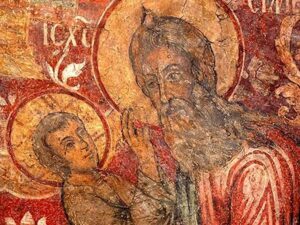 Luke’s Gospel describes Simeon as waiting in the temple for the consolation of Israel. Simeon had grown old waiting, modeling a highly discerning contemplative posture that tirelessly refused mis-identifying a pretender Messiah as the expected one. This patient, discerning, contemplative gaze is desperately-needed now, with myriad deceivers afoot who offer false comfort.
Luke’s Gospel describes Simeon as waiting in the temple for the consolation of Israel. Simeon had grown old waiting, modeling a highly discerning contemplative posture that tirelessly refused mis-identifying a pretender Messiah as the expected one. This patient, discerning, contemplative gaze is desperately-needed now, with myriad deceivers afoot who offer false comfort.The Israeli Defense Force and Benjamin Netanyahu are certainly falses comforts for Israelis now, as is the United States for Israel or for Ukraine. Hamas is a false comfort for the Palestinians, and Joe Biden and Donald Trump for Americans. Simeon invites us to look to the living Word of God, Jesus himself– refusing lies and false comfort from false Messiahs.
The consolation (paraklēsis) that Simeon awaits (or looks for) is offered to us by God, as Paul states in 2 Corinthians 1:3-4.
“Blessed be the God and Father of our Lord Jesus Christ, the Father of mercies and God of all comfort, who comforts us in all our affliction so that we will be able to comfort those who are in any affliction with the comfort (paraklēsis) with which we ourselves are comforted by God.”
Daniel Bourguet, in his beautiful book, Encounters with Jesus, reflects on Simeon’s recognition and embrace of baby Jesus, who Mary and Joseph brought to him in the temple as the true, consoling Messiah he awaited.
“Simeon was fulfilled, completely and wonderfully answered, but in a way which was also very sober, requiring absolute faith on his part. The old man had seen dozens and dozens of young couples pass through the Temple, presenting their first-born sons to God in accordance with the law of Moses. Every new household in Israel had to do what Mary and Joseph were doing, and they all passed through the Jerusalem Temple (Lev 12). How did Simeon know that on this day the baby being presented was the one he was awaiting?
According the prophets, the Christ had to be a descendant of David and therefore of the royal family. Simeon could hardly be thought mistaken if he had been expecting a child of a wealthy family, presented to God with the offering of a lamb as the sacrifice, just as the law required of those with the means (Lev 12:6).Well, on this day Mary and Joseph were not bringing a lamb but two birds, as allowed by the law if the couple were too poor (Lev 12:8). How was Simeon to recognize in this son of paupers the descendant of king David?”
“Mary and Joseph were silent in the old man’s presence. They had told him nothing of what the Bethlehem shepherds had said, nothing of the visit of the magi. The magi had returned home by a route unknown. The shepherds had gone back to their fields. The son of David entered the Temple with no royal escort. Heaven did not open; no angel appeared; there was no shining star. No sign was given by God, no miracle! Nothing! There was nothing to attest to the child really being the Christ! The young couple were there with two birds as an offering and a tiny infant just like any other child of poverty . . . But Simeon knew him! If he knew him it is because of the most unspoiled and pure faith. Only the Holy Spirit could have placed this deep conviction within him, with nothing more than the thought as evidence, “This is him!”
The parents had said nothing, and neither had God; there was no need for even the hint of a sign; Simeon’s faith was enough . . . A faith as beautiful as this is a wonder to me in its simplicity.
A life fulfilled
Your hands have to be empty if you’re going to hold a baby! Simeon’s had been empty for many long years. When he received Christ his heart was complete, his life became full, just in one day; so completed and satisfied was he that he was ready to die. He asked nothing more than that he might depart in peace. Once again we are challenged by this man; what do we understand nowadays when we speak of a life that is fulfilled? So many trifles, so many vanities occupy our lives! Simeon’s life was fulfilled in that one day by a silent baby who he had held in his arms for a brief moment, and that is all! Our lives, so full of the superfluous, seem derisory beside this.
Simeon therefore teaches us one thing, forcibly — that Christ on his own can truly fill a life; he can even fill it silently, in God’s silence, and fill it to the point that death takes nothing away.
John the Baptist was filled with perfect joy, simply at the sound of Christ’s voice (John 3:29), so what must Simeon’s joy have been to hold him in his arms. “ Luke has no word to describe it; it is beyond words.”
Order your copy of Daniel Bourguet’s Encounters with Jesus here. This fine book includes chapters on Zacchaeus, the deaf-mute, the poor widow, and Simeon.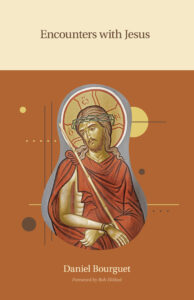
December 4, 2023
Choosing the life-giving Gospel of Jesus Christ over false “Gospels” of death
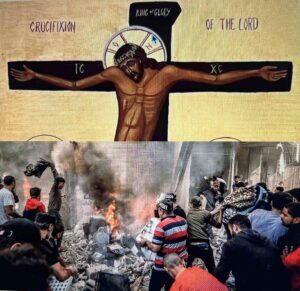 For followers of Jesus “the Gospel” is the life-giving message that God became human in his Son Jesus Christ, to seek out and save the lost, destroying the power of sin and death through dying by execution on the cross. Jesus is raised from the dead, empowering his disciples through the Holy Spirit to announce and embody his kingdom for the salvation of the world.
For followers of Jesus “the Gospel” is the life-giving message that God became human in his Son Jesus Christ, to seek out and save the lost, destroying the power of sin and death through dying by execution on the cross. Jesus is raised from the dead, empowering his disciples through the Holy Spirit to announce and embody his kingdom for the salvation of the world.
In diabolical contrast, the Israeli Defense Force has launched a intelligence-gathering system they call “Habsora” (“The Gospel), that identifies human targets of interest in Gaza to kill, knowingly including Palestinian civilians, including women and children. Christians and others who support Israel’s war in Gaza are effectively aligning themselves with this anti-Gospel of death, which diametrically opposes God’s life-giving Gospel of Jesus Christ.
According to Yuval Abraham investigative report published November 30th in the Israeli media outlet +972 Magazine, “A mass assassination factory’: Inside Israel’s calculated bombing of Gaza” the “Gospel”:
“Is largely built on artificial intelligence and can “generate” targets almost automatically at a rate that far exceeds what was previously possible. This AI system, as described by a former intelligence officer, essentially facilitates a “mass assassination factory.”
According to MEM, Middle East Monitor’s December 1st article “Israel’s AI system for target selection [the Gospel] has generated ‘mass assassination factory’ in Gaza”:
“The Israeli army has files on the vast majority of potential targets in Gaza — including homes — which stipulate the number of civilians who are likely to be killed in an attack on a particular target, sources told +972. This number is calculated and known in advance, and the army’s intelligence units also know shortly before carrying out an attack roughly how many civilians are certain to be killed.”
“Highlighting the shocking disregard for civilian life, the report found that the Israeli military command knowingly approved the killing of hundreds of Palestinian civilians in an attempt to assassinate a single top Hamas military commander. “The numbers increased from dozens of civilian deaths [permitted] as collateral damage as part of an attack on a senior official in previous operations, to hundreds of civilian deaths as collateral damage,” one source told +972.”
In light vs. dark contrast, “Jesus was going throughout all Galilee, teaching in their synagogues and proclaiming the gospel of the kingdom, and healing every kind of disease and every kind of sickness among the people” (Mt 9:35).
Jesus’ presence as God’s Son and Israel’s Messiah were identified as being “full of grace and truth” (Jn 1:14). He came to “seek and save that which is lost” (Lk 19:10), and “save people’s lives and not destroy them” (Lk 9:56).
Jesus sends John the Baptist’s disciples back to John to report that his actions are in alignment with signs of Israel’s expected Messiah in Isaiah 35:5-6 and Isaiah 61:1.
“The blind receive sight and the lame walk, the lepers are cleansed and the deaf hear, the dead are raised up, and the poor have the Gospel preached to them” (Mt 11:5).
As followers of Jesus committed to proclaiming and embodying the Gospel, we must refuse aligning ourselves with any nation (Israel and our own countries included) that engages in the killing of human beings, regardless of official justifications. May we prayerfully work to expose and repent of any agreements we have with the powers of death, fully embracing the life-giving power of God, as Paul states clearly in Romans 1:16.
“For I am not ashamed of the Gospel, for it is the power of God for salvation to everyone who believes, to the Jew first and also to the Greek.”
Click here to order a copy Guerrilla Gospel. on my weekly podcast “Disciple: Word, Spirit, Justice, Witness” on Spotify or Apple).
November 28, 2023
Following Jesus, our commander in chief
 My recent interactions with persecuted Christians in in the underground church in Iran have got me thinking afresh about Jesus’ outsider, subversive, ‘behind enemy lines’ status. In these days when some calling themselves Christians seek political power and control, we must lean into our stranger and alien status, seeking understanding as to what it means to follow Jesus as the Messiah, and enter his kingdom “not of this world.”
My recent interactions with persecuted Christians in in the underground church in Iran have got me thinking afresh about Jesus’ outsider, subversive, ‘behind enemy lines’ status. In these days when some calling themselves Christians seek political power and control, we must lean into our stranger and alien status, seeking understanding as to what it means to follow Jesus as the Messiah, and enter his kingdom “not of this world.”
Last week I met with ten Iranians via Zoom, who asked me to take them through Guerrilla Gospel– which my Persian-speaking interpreter communicated as we worked through through the following excerpt from the Preface and Chapter One before doing some other Bible studies.
“Jesus of Nazareth is my inspiration for life and ministry, and what I call “Bible studies” or “guerrilla gospel encounters.” Through his life and teaching recorded in the Gospels of the New Testament, he defines the word gospel, which means good news or liberating message. According to New Testament Scriptures, Jesus is God’s Son, Israel’s Messiah, and the Lord himself in the flesh. He was born into a world marked by oppression and injustice to announce and embody God’s global liberation movement. Like an insurgent, Jesus comes in under the radar, behind enemy lines, and then builds a foundation of trust with a growing entourage of humble followers. He resists the authorities of his day, along with their legal systems, and he calls others to join him.
Jesus incites a revolution that he calls the Kingdom of God. He starts out incognito, but after his baptism at age thirty, he publicly demonstrates an unprecedented authority in his teaching, which is backed up by acts of healing, advocacy, and liberation on behalf of the oppressed, poor, or disenfranchised. In Jesus’ many encounters in the Gospels, he breaks the established rules to advocate for the marginalized. He confronts the powers—both visible and invisible, modeling a holistic spiritual warfare that brings freedom.
I am compelled by the way he loves people so freely and effectively wherever he goes, seeking and finding the lost and forsaken, raising up the downtrodden and hopeless, offering abundant life to all who will follow him. Reading about Jesus in the Gospels inspires me to follow him, to go deep with him, to tune into his instructions in my daily life, and to work with him to reach others with the good news he embodies and proclaims throughout the New Testament.
Following Comandante Jesús
I joke with former gang members involved in Tierra Nueva’s ministry about how Jesus is our comandante, which is Spanish for military or guerrilla commander. He’s the one who calls the shots, instructing soldier disciples in the trenches of warfare to advance the movement as an unprecedented and truly life-giving insurgency, to win over inhabitants, neighborhoods and people groups of the world for the kingdom of God. These friends are used to gang shot-callers or are themselves shot-callers. But they are tired of living in fear, grieving beloved homies killed in drive-by shootings, and spending years of their lives serving long prison sentences. We love that Jesus is an outsider, on the hunt for recruits, eager to go out on missions. We love that he gathers with his confidants in the mountains or in boats, on foot or on the move from town-to-town, stopping along roadsides, visiting people in homes, teaching and healing crowds along the way in fields or synagogues, on beaches or in the wilderness.
Talking like this about Jesus gets us excited. We’ve all seen too many casualties of the fast life of both legal and illegal workaholism, drugs, alcohol, and poverty, gang violence and domestic violence. We’ve had enough of relationship breakdown, children taken by Child Protective Services, incarceration, premature death by suicide, homicide, overdose, and different illnesses. Many of us know firsthand the life-restoring bene- fits of Jesus’ saving help and want to see others benefit too. Being part of a movement of true liberation compels us, giving us a new reason to live— and perhaps even something to die for.
The dictionary definition for “guerrilla” works to a certain extent to describe Jesus and his followers, past and present: “a member of a band of irregular soldiers that uses guerrilla warfare, harassing the enemy by surprise raids, sabotaging communication and supply lines.” In Spanish, guerrilla is the diminutive for guerra (war), which includes the notion of small-scale war. Guerrilla warfare is defined as “the use of hit-and- run tactics by small, mobile groups of irregular forces operating in terri- tory controlled by a hostile, regular force.” The ministry of Jesus is all about reaching and empowering ordinary people and usually involves prolonged struggle against formidable powers. It requires flexibility, adaptability, and being on-point around the clock.
Unlike modern guerrilla warfare, Jesus refuses physical violence, coercion, and terror (Mt 26:52; Lk 9:55). But like guerrilla activity, Jesus uses unconventional tactics, travels in small, mobile bands (Mk 9:30), recruits from among the outcasts (Mk 2:15), advocates for the oppressed (Lk 13:16), depends on local collaborators for support (Lk 8:3; Jn 12:1-2), and multiplies his followers and thereby his fighting force (Lk 10:1).’
There’s a subversive dimension of Jesus’ presence as God infiltrates the human race. God’s strategy is to be born undercover, behind enemy lines, into a family that is both humble and yet has ties to the people’s hero, King David. Jesus, though, takes the revolution to a new level. Jesus’ first thirty years as a carpenter in Nazareth reveal how keen God is about sleeper-cell beginnings as a way to imbed his yeast-like realm outside the radar of empire. Once activated at his baptism, Jesus embodies an unprecedented authority that attracts adherents, and the movement multiplies amongst the disenfranchised.
Jesus’ main way of operating is to meet up with people wherever he finds them. He is not a commander who runs things from a safe distance, but an on-the-ground, front-line activist. He often takes the initiative, going after people personally. He sees and calls ordinary people—fish- ermen (Mt 4:18–22) and tax collectors (Mt 9:9), including the chief tax-collector, Zaccheus, whom he calls down from a tree, and then invites himself to his house for a stay (Lk 19:1–10). Jesus sees a man paralyzed for thirty-eight years among invalids at a sheep gate, asks him if he wants to be well, and then heals him on the spot (Jn 5:2–9). Jesus also attracts adherents from among more privileged sectors: the Pharisee leader, Nicodemus, who is impressed by his signs (Jn 3:1–2); Joanna, the wife of Herod’s steward, Chuza who supports Jesus and the disciples financially; (Lk 8:3) a synagogue official who is desperate to see his dying daughter healed (Lk 8:41); a Roman centurion who begs Jesus to heal his slave (Mt 8:5–9). Are you ready to join up?
Other times, Jesus’ encounters are a bit on the fly, unplanned meetings that seem to be interruptions. Blind people and lepers cry to him for mercy from the roadsides, and he stops to heal or cleanse, teaching as he goes (see Lk 18:35–43; Mk 10:46–52; Mt 8:1–3). People also come to Jesus with the need for deliverance (e.g., Mt 8:16, 9:32–33; Mk 5:2–16). In every case, these encounters become opportunities for Jesus to teach, challenge, and offer immediate relief. In one instance, men cut a hole in the roof and lower a paralyzed man down in front of Jesus and some antagonistic religious leaders, and Jesus spontaneously declares to the paralytic, “your sins are forgiven” (Mk 2:2–7). Then Jesus proves his authority by telling the man to “rise, take up your pallet and go home” (Mk 2:8–11). Such actions inspire discussion and sometimes aggression from Jesus’ enemies.
Jesus often uses the language of guerrilla warfare in his instructions to his disciples, and there’s a combativeness to his words and actions throughout the Gospels. “Behold, I have given you authority to tread on serpents and scorpions, and over all the power of the enemy, and nothing will injure you,” Jesus instructs seventy of his fresh recruits (Lk 10:19). He also proclaims violence against unseen enemies: “The Son of God appeared for this purpose, to destroy the works of the devil” (1 Jn 3:8). Since “the whole world lies in the power of the evil one,” Jesus and his disciples must organize a strike force and be adequately equipped for the task (1 Jn 5:18).
Jesus also uses kingdom tactics and an arsenal of weapons that are “not of this world” (Jn 18:36), such as prayer, fasting, forgiveness, love, and the power of God. His armory also includes words, which he and his disciples wield as an integral part of their mission to announce the good news to all of creation (Mk 16:15). Jesus himself says: “Do not think that I came to bring peace on the earth; I did not come to bring peace, but a sword” (Mt 10:34). This sword is elsewhere called “the sword of the Spirit” and is equated with the Word of God (Eph 6:17) as part of the believers’ arsenal (Eph 6:13-17). Hebrews 4:12 states this clearly: “For the word of God is living and active and sharper than any two-edged sword.” Jesus even drives out evil spirits with a word (Mt 8:16).
Jesus’ ministry of the Word includes teaching, preaching, healing, deliverance, and prophecy. Jesus commands his disciples: “Preach, saying, ‘The kingdom of heaven is at hand.’ Heal the sick, raise the dead, cleanse the lepers, cast out demons. Freely you received, freely give” (Mt 10:7–8). All these actions and others too are part of Jesus’ weaponry. Physical violence is never included in Jesus’ tactics—but rather active enemy love. This love includes the resistance of evil and injustice through exposure and verbal confrontation as well as public non-compliance with unjust laws.
Throughout Jesus’ earthly ministry, he is neither a religious nor social insider, but operates outside the circles of Jewish religious organizations and certainly of the Roman Empire. He does not enjoy elevated status within a religion collaborating with the powers, nor is he an accepted leader by the dominant culture. Rather, he lives outside an overarch- ing theocracy, and the kingdom he proclaims is decidedly “not of this world” (Jn 18:36). In fact, in a subversive analogy he compares himself to a thief who comes to burglarize a house (Mt 24:43; Lk 12:39), first tying up the strong man before robbing his goods (Mt 12:29; Mk 3:27). This imagery suggests that the world is like a prison, which implies that Jesus’ mission—and therefore ours—is to engage in prison breaks that will liberate captives rather than reform and take over the prison! Jesus even commissions Peter as head of a movement called church to storm the gates of hell to free captives (Mt 16:18).
Unlike contemporary religions and political ideologies that seek to increase control and domination, Jesus doesn’t call his followers to take up arms in a combatant way to prevent or defend against the kingdoms of this world (Mt 20:25-26). In fact, Jesus rebukes his disciples for trying to defend him with weapons, saying: “Do you think that I cannot appeal to my Father, and he will at once put at my disposal more than twelve legions of angels?” (Mt 26:53).
Jesus describes himself as “from above” (Jn 3:31) in contrast to every- one else “from below,” (Jn 8:23) and tells his contemporaries that he will soon leave to a place where they can’t find him (Jn 7:34–36). From his rightful place in this kingdom, he informs us of heaven’s priorities so that we can embody his “on earth as in heaven” agenda (Mt 6:10). Today, in our increasingly post-Christendom world, we must deliberately own our “aliens and strangers” status (1 Pt 1:1, 2:11) by fully embracing our heavenly “no longer strangers and aliens” identity (Eph 2:19). As you follow Jesus, an identity shift happens that will put you at odds with the culture and dominant values around you, leading others to possibly view you as a kind of resister. Jesus describes himself as one who is rejected (Jn 12:48), hated (Jn 7:7, 15:18, 23, 24, 25), and persecuted (Jn 15:20). He promises his followers that they will experience these things as well,4 as he includes them as “not of the world” (Jn 17:14).
In contrast to guerrilla combatants who operate in secrecy, sneaking around the powerful state, Jesus mostly speaks and acts openly in public settings. He teaches in synagogues and in the Jerusalem temple, over- turning the tables of money-changers and directly confronting religious leaders (Mt 21:12-13). “I have spoken openly to the world; I always taught in synagogues and in the temple, where all the Jews come together; and I spoke nothing in secret,” Jesus tells Pilate (Jn 18:20). Jesus considers the temple his Father’s house (Lk 2:49) and recognizes that “the earth is the Lord’s” (Ps 24:1). Yet when Jewish leaders plot Jesus’ death, he stops moving about in Judea and limits his walking to Galilee (Jn 7:1). When temple leaders in Jerusalem pick up stones to throw at Jesus, he hides himself (Jn 8:59). When they try to seize him, he eludes “their grasp” (Jn 10:39). When Jewish authorities begin planning together to kill him, “he no longer” continues “to walk publicly,” but goes “away from there to the country near the wilderness” (Jn 11:54). The fact that chief priests and Pharisees order the people to inform them about Jesus’ whereabouts in order to arrest him marks Jesus as a subversive troublemaker who must take precautions (see Jn 11:57). So does the fact that he is eventually crucified between two criminals (Lk 23:32).
Jesus’ public ministry only lasts three years before he is arrested and executed as a law-breaker by crucifixion. In that short time, Jesus focuses on living out his Father’s mission. He recruits twelve disciples, who travel with him everywhere, receiving his teaching and witnessing his direct action. Eleven of these disciples are among the 120 who receive the Holy Spirit at Pentecost. Jesus’ explosive life inspires a movement of followers, who—after being empowered by the Holy Spirit at Pentecost—continue to embody and proclaim the kingdom of God.
The life and teachings of Jesus fulfill God’s historic mission to save the world and set the bar for action until he returns. Jesus’ many encounters with people are written up in the New Testament Scriptures to be read and discussed today, inviting and inspiring us towards Christ-like action. Our task is to figure out how we can transmit his rich teaching in similar places on behalf of similar beneficiaries—how we can “get away with a Bible study,” as I’m fond of saying—or with a guerrilla gospel encounter.
Click here to order a copy Guerrilla Gospel. on my weekly podcast “Disciple: Word, Spirit, Justice, Witness” on Spotify or Apple).
Bob Ekblad's Blog
- Bob Ekblad's profile
- 11 followers


